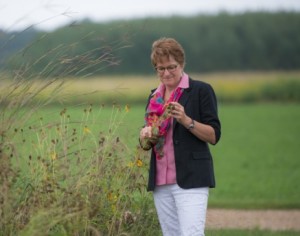 University Distinguished Professor Emeritus of Plant Biology
University Distinguished Professor Emeritus of Plant Biology
Ph.D. Michigan State University, 1980
W.K. Kellogg Biological Station
Michigan State University
Hickory Corners, MI 49060
Email: grossk@kbs.msu.edu
Research Interests
I am broadly interested in the causes and consequences of species diversity in plant communities. My current research focuses on how nutrient input and management impacts the diversity, productivity and composition of grasslands. We established several long-term experiments to test hypotheses about how nutrient enrichment (fertilization) impacts grasslands. In one experiment (part of the KBS LTER) we followed community response to fertilization and disturbance for over 25 years. Another set of experiments in a low-productivity grassland in SW Michigan allowed us to evaluate how the scale of soil resource heterogeneity and presence of clonal species influences plant diversity and community composition. Particular interests include how species traits, particularly clonality and growth form, affect responses to resource enrichment.
I am also interested in the consequences of diversity in managed agricultural ecosystems. On the KBS LTER project we monitored the long-term effects of different crop management systems on the composition of weed communities in different crops. We also established an experiment (the Biodiversity Experiment) in which crop type and rotation were varied to determine the impacts of rotational diversity on crop yield, weed communities and a variety of ecosystem services. Experiments and field studies established as part of the Great Lakes Bioenergy Research Center (GLBRC) at KBS are used to test hypotheses relating diversity, productivity and management practices to the sustainability of alternative biofuel crops.
As director of KBS I promoted and supported a number of programs to provide undergraduates with research and educational experiences that help define and direct their career interests.
Selected publications
- Suding, KN, KL Gross and G Houseman. 2004. Alternative states and positive feedbacks in restoration ecology. Trends in Ecology and Evolution 19:46-53.
- Gross, K.L., G.G. Mittelbach, and H. Reynolds. 2005. Invasiblity and grassland biodiversity: effects of nutrient addition and cover reduction. Ecology 86: 476-486.
- Suding, KN, SL Collins, L Gough, CM Clark, EE Cleland, KL Gross, D Milchunas, and S Penning. 2005. Functional traits predict species loss in response to resource enhancement. PNAS 102: 4387-4392.
- Suding, KN and KL Gross. 2006. Modifying native and exotic species correlations: The influence of fire and seed additions Ecological Applications 16: 1391-1324.
- Eilts, A., GG Mittelbach, H Reynolds, KL Gross. 2011. Resource heterogeneity, soil fertility and species diversity: Effects of clonal species on plant communities. American Naturalist 177: 574-588
- Gough, L, K.L. Gross, E. Cleland, C. Clark, S. Collins, J. Fargione, S. Pennings, K. Suding. 2012. Incorporating clonal growth form clarifies the role of plant height in response to nitrogen addition. Oecologia 169: 1053-1062

A legacy of conservation; a commitment to sustainability.
3700 E. Gull Lake Drive
Hickory Corners, MI 49060
(269) 671-5117
info@kbs.msu.edu